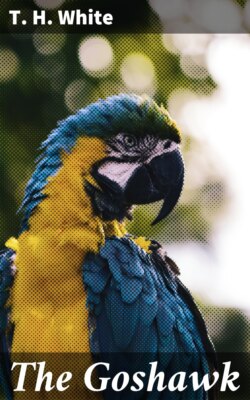Читать книгу The Goshawk - T. H. White - Страница 11
На сайте Литреса книга снята с продажи.
Friday, Saturday, Sunday
ОглавлениеTable of Contents
They were days of attack and counter-attack, a kind of sweeping to and fro across disputed battle fields. Gos had gone back a long way toward wildness with his first sleep. Each day the ceaseless calls of housekeeping and lardering called Crusoe away from him, as his educational needs called him back, and so it was backward and forward the whole time. Sometimes he would step to the glove after hesitation, but without temper, and sometimes he would fly away as if I had come to do him murder. We walked alone for hours every day, Gos sometimes conversing in amicable if puzzled mews, sometimes flapping and bating twice every minute. All the time there was a single commandment to be observed. Patience. There was no other weapon. In the face of all set-backs, of all stupidities, of all failures and scenes and exasperating blows across the face with his wings as he struggled, there was only one thing one could seek to do. Patience ceased to be negative, became a positive action. For it had to be active benevolence. One could torture the bird, merely by giving it a hard and bitter look.
No wonder the old austringers used to love their hawks. The effort which went into them, the worry which they occasioned, the two months of human life devoted to them both waking and dreaming, these things made the hawk, for the man who trained it, a part of himself. I was startled by the upper classes, surprised by the gentleman who allowed a ghillie to gaff his salmon for him—it made the salmon so much the less his—and, with hawking especially, could not understand a nobleman who kept a falconer. What pleasure would he get, taking this strange bird from the fist of a stranger and hurling it into the air? But to the falconer, to the man who for two months had made that bird, almost like a mother nourishing her child inside her, for the sub-consciousness of the man and the bird became really linked by a mind’s cord: to the man who had created out of a part of his life, what pleasure to fly, what terror of disaster, what triumph of success!
The end in view was to make Gos come for food. In the end he was to come a distance of at least a hundred yards, the moment he was called, but at present it was enough if he would first not fly away when I approached. Next he had to learn to step to the fist for a reward of food. (The way to every creature’s heart was through the belly. This was why women had insisted on the prerogative of being allowed to cook.) Finally he must jump to the fist with one flap of the wings, as a preliminary to increasing the distance.
It was only patience which could achieve this end. I realized that the hawk must be tied to his perch by a leash, and now for three days stood a yard away from him, holding meat out in my hand. I went to him again and again, speaking to him from outside the mews, opening the door slowly, edging forward on feet that moved like the hands of a clock.
Here comes (one thought, suddenly catching oneself out) that excellent piece of work called man, with his capacity for looking before and after, his abilities to reflect upon the enigmas of philosophy, and the minted storehouse of an education that had cost between two and three thousand pounds, walking sideways to a tied bird, with his hand held out in front of him, looking the other way and mewing like a cat.
But it was pure joy, even joy to stand absolutely motionless for fifteen minutes, or while one slowly counted a thousand.
Part of the joy was that now, for the first time in my life, I was absolutely free. Even if I only had a hundred pounds, I had no master, no property, no fetters. I could eat, sleep, rise, stay or go as I liked. I was freer than the Archbishop of Canterbury, who no doubt had his fixed times and seasons. I was as free as a hawk.
Gos had to be taught to know his call. Later on he might get out of sight when being flown at game, and had to be so taught that he could be recalled by the whistle. Most falconers used an ordinary metal whistle, but my escaped soul felt too poetical for that. I felt that Gos was too beautiful to be shrilled at with a policeman’s mechanical note. He was to come to a tune, and if I could have played it I would have bought a penny whistle. But I could only whistle with my mouth, and that had to do. Our melody was a hymn, ‘The Lord’s my Shepherd’—the old metrical Scottish one.
Hawks were taught to come to their whistle by associating it with food, like Pavlov’s famous dog. Whenever they were fed the whistle was blown, a kind of dinner gong. So now, as one sidled up to that fierce, suspicious eye, the mews reverberated day in and day out with this sweet highland tune. One came to hate it in the end, but not so much as one would have hated anything else. Besides, I whistled it so sadly that there was always a faint interest in trying to keep to the right notes.
